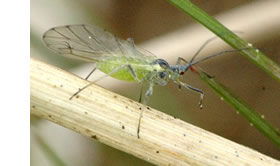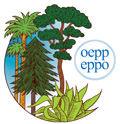
10th meeting of the Resistance Panel on Plant Protection Products
Rothamsted Research, Harpenden (GB) 2015-09-16/17

(Ecology of Commanster). Wikimedia Commons
The Resistance Panel on Plant Protection Products was held back-to-back with the Resistance 2015 Conference (Rothamsted Research, Harpenden, GB, 2015-09-16/17). Since many Panel members attended both events the Panel meeting was consequently reduced to 1.5 days. Special thanks are due to the local organizers for arranging the meeting, in particular Mr Fraaije and to Mr Ashby who kindly accepted to take notes during the meeting and provided a draft report afterwards.
The regular topic on the agenda is updates from Panel members on the current and new resistance cases and management strategies in their countries. Mr Foster, Chair of the Insecticide Resistance Action Group (IRAG- UK), gave a brief review of the history of the group (established in 1997) and its aims and objectives. He highlighted the 3 main pyrethroid resistance problems in the UK (cabbage stem flea beetles (Psylliodes chrysocephala), grain aphid (Sitobion avenae) and pea and bean weevil (Sitona lineatus)).
This was followed by an oral update from Mr Ashby who informed the Panel that in 2015 the UK Weed RAG Steering Group has produced the document Guidelines for minimising the risk of Glyphosate Resistance in the UK and that UK Fungicide RAG has updated guidance on Fungicide Resistance Management in Cereals and developed guidance in Apple and Pear Pathogens. These documents and more information are available at UK RAGs website. These updates by the host country were followed by oral updates from other Panel Members for their respective countries (AT, CH, DE, DK, FR, IT, NL and SE).
Another regular topic on the agenda is updates from the international Resistance Action Committees (RACs). Ms Salas (European Herbicide RAC), Mr Genet (Fungicide RAC) and Mr Slater (Insecticide RAC) informed the Panel of the new developments in their respective Committees. On behalf of IRAC Spain, Ms Torné identified the need for a sustainable resistance management strategy in Europe. Supermarket limitations on the number of residues per crop are restricting the number of active substances available for use in the consumable protected crop sector which is in turn creating resistance management problems. IRAC Spain has taken the initiative and would like to create a working group dealing with ‘sustainable RM strategy’ involving all interested parties.
The Panel was updated by Mr Paveley, Mr van den Bosch and Mr Helps on the progress of the two UK projects.
- Mr Helps gave a presentation on the project Combating insecticide resistance in major UK pests. The objectives are to compare the net benefit of different insecticide resistance management strategies for insects with contrasting life-histories and damage implications (including development of models); to develop a method to assess insecticide resistance risk based on objective and measurable criteria and to transfer the new knowledge of anti-resistance strategies and risk assessment to the relevant end-user communities.
- Mr Paveley presented the results from the UK project Assessing the resistance risk associated with systemic fungicide seed treatments and the effectiveness of risk modifiers, which is due to finish in December 2015.
The Panel was briefed on the status of the French Alert List on resistance. The database aims to give the scientific community, field technicians, advisors and regulatory authorities current information on resistance to certain active substances. It requires a lot of work and it is still not published. The Panel agreed that it would be helpful to have such an information-sharing tool and that a good starting point would be to gather together existing knowledge of confirmed resistance cases. Information from the existing French Alert List together with information from the national RAGs will be coordinated by EPPO who will consider the possibility of developing this into a database to be made available to all. Further discussion by the Panel will be required to establish a format and process for adding new cases to the database.
At its previous meetings the Panel regretted that national authorities are no longer willing to invest resources in research on resistance and resistance management. The Panel was concerned that it may end up with a very unbalanced situation where the only available information comes from industry. Therefore a statement was produced by the Panel and approved by the Working Party on Plant Protection Products (May 2015) to spread the message that more independently funded resistance monitoring is required to better understand and manage the increasing problem of resistance in plant protection products. This statement was sent to the EPPO Council (September 2015) and all Heads of the NPPOs.
The Panel will next meet on 2016-09-14/16 (venue to be confirmed).
